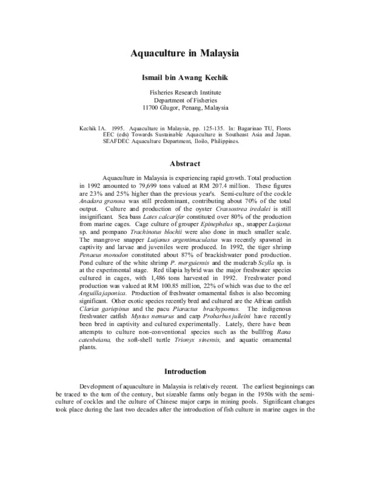Perlihatkan publikasi sederhana
Mangrove-associated mollusc research at SEAFDEC/AQD
| dc.contributor.author | De Castro-Mallare, Teresa R. | |
| dc.contributor.editor | Primavera, Jurgenne H. | |
| dc.contributor.editor | Garcia, Luis Ma. B. | |
| dc.contributor.editor | Castaños, Milagros T. | |
| dc.contributor.editor | Surtida, Marilyn B. | |
| dc.date.accessioned | 2011-06-22T09:35:55Z | |
| dc.date.available | 2011-06-22T09:35:55Z | |
| dc.date.issued | 2000 | |
| dc.identifier.citation | de Castro-Mallare, T. R. (2000). Mangrove-associated mollusc research at SEAFDEC/AQD. In J. H. Primavera, L. M. B. Garcia, M. T. Castaños, & M. B. Surtida (Eds.), Mangrove-Friendly Aquaculture: Proceedings of the Workshop on Mangrove-Friendly Aquaculture organized by the SEAFDEC Aquaculture Department, January 11-15, 1999, Iloilo City, Philippines (pp. 177-183). Tigbauan, Iloilo, Philippines: Southeast Asian Fisheries Development Center, Aquaculture Department. | en |
| dc.identifier.isbn | 9718511423 | |
| dc.identifier.uri | http://hdl.handle.net/10862/457 | |
| dc.description.abstract | Mollusc research at the Aquaculture Department of the Southeast Asian Fisheries Development Center started in 1975 and focused on two commercially important mangrove-associated bivalves, the slipper-shaped oyster (Crassostrea iredalei) and the green mussel (Perna viridis). Studies conducted were on spatfall forecasting to increase collection of seeds from the wild; improvement of farming techniques; seed production in the hatchery; bivalve sanitation; and transplantation. These studies have led to the development of a suitable spat collector for oyster and mussel; promotion of the raft culture method for oysters and mussels to prevent siltation of growing areas, including a low-cost raft design for this purpose; refinement of transplantation techniques to increase production and to grow osyters and mussel in suitable areas without natural populations; and desgin of a prototype low-cost depuration unit. A socio-economic study of oyster and mussel farming practices in Western Visayas provided information on current farming practices and profitability. A study done on the use of green mussel as biofilter in a semi-intensive shrimp pond showed that shrimp stocked with mussels grew faster than those without. A study on the biology and fishery of the "imbao" Anodontia edentula, another mangrove-associated bivalve, is ongoing. Spawning has been achieved in the laboratory and larval stages monitored were first polar body, 2-cell stage, morula, ciliated gastrula, trocophore, veliger, and pediveliger. | en |
| dc.language.iso | en | en |
| dc.publisher | Aquaculture Department, Southeast Asian Fisheries Development Center | en |
| dc.subject | Crassostrea iredalei | en |
| dc.subject | Perna viridis | en |
| dc.subject | Anodontia edentula | en |
| dc.subject | Philippines | en |
| dc.subject | mussels | en |
| dc.subject.lcc | VF SP 261 | |
| dc.title | Mangrove-associated mollusc research at SEAFDEC/AQD | en |
| dc.type | Conference paper | en |
| dc.citation.spage | 177 | |
| dc.citation.epage | 183 | |
| dc.citation.conferenceTitle | Mangrove-Friendly Aquaculture : Proceedings of the Workshop on Mangrove-Friendly Aquaculture organized by the SEAFDEC Aquaculture Department, January 11-15, 1999, Iloilo City, Philippines | en |
| dc.subject.asfa | shellfish | en |
| dc.subject.asfa | mussel culture | en |
| dc.subject.asfa | oyster culture | en |
| dc.subject.asfa | mangroves | en |
| dc.subject.asfa | mollusc culture | en |
| dc.subject.asfa | aquaculture | en |
| dc.subject.asfa | oysters | en |
| dc.subject.asfa | research programmes | en |
| dc.subject.scientificName | Crassostrea iredalei | en |
| dc.subject.scientificName | Perna viridis | en |
| dc.subject.scientificName | Anodontia edentula | en |
| dc.subject.scientificName | Magallana bilineata | en |
Files in this item
Publikasi ini ada di koleksi berikut
-
Mangrove Friendly Aquaculture [18]
Proceedings of the Workshop on Mangrove-Friendly Aquaculture organized by the SEAFDEC Aquaculture Department, January 11-15, 1999, Iloilo City, Philippines





